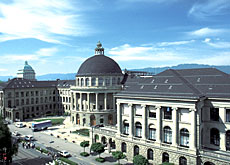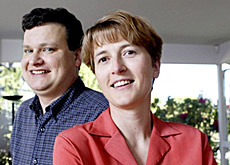Federal Institutes aim to top academic rankings

The new head of Switzerland’s two Federal Institutes of Technology says he wants to ensure they remain among the top universities in the world.
But Alexander Zehnder told swissinfo that reforms were needed if the schools in Lausanne and Zurich were to compete with institutions such as Harvard and Oxford.
Zehnder, a professor of environmental biotechnology in Zurich, was appointed president of the board of both institutes in July.
At a press conference in Bern on Tuesday, he outlined a series of proposals aimed at boosting international recognition for Switzerland’s most prestigious centres of scientific research.
These include the development of six so-called centres of competence, which will bring together the institutes and outside partners, to be located in or near major cities.
Zehnder also called for the introduction of a rigorous selection procedure for future students and appealed for a more aggressive pursuit of funds.
swissinfo: How are you going to implement the reforms you have outlined?
Alexander Zehnder: We have to consider shutting down departments that are not internationally competitive. We also want to attract the best academics and students. We need to reconsider how we are financed. Over 75 per cent of our funding comes from taxpayers. We have to get endowments to give us some independence from politicians.
swissinfo: Is this a radical change for Switzerland?
A.Z.: Well, for Switzerland any change is by definition radical. Our aim is to pursue a path we have already been following, but a little more vigorously. It’s not enough just to talk about change, because if we do we will just lose our place in the top tier.
swissinfo: You say you want to improve the image of the federal institutes both at home and abroad. How difficult is this when you are competing with names like Harvard and Oxford?
A. Z.: Well, we do have a brand name. If you go to the big American universities like Harvard or Stanford, people there know we have great schools and a good academic environment.
In the latest Academic Ranking of World Universities [by China’s Shanghai Jiao Tong University], the Federal Institute in Zurich was named the 27th best university in the world, and the best in continental Europe. But we still have some way to go. My goal is to be among the top schools for all types of rankings.
swissinfo: Universities tend to focus these days more on development than research. Is that the road you want to follow?
A.Z.: We will not move away from fundamental research. It is the basis of everything we do. But by the same token, you cannot shy away from developing products. The centres of competence we are building up will allow us to create platforms where industry, scientists and civil society can come together.
We want our innovations to be a step ahead of the times and be ready for the demands of tomorrow. But it’s not our role to respond to immediate demand.
swissinfo: You say you want to attract the best students. How do you intend to go about this?
A.Z.: We would like to introduce something new for the Swiss university system by interviewing prospective students. We want them to know what to expect and what we want from them. The interview is the first contact with university representatives and it helps create ties. You are always interviewed for any position you apply for during your life, and this should also hold true for students.
swissinfo: The idea of a selection process goes against the grain in Switzerland. Is this proposal politically acceptable?
A.Z.: We don’t expect to do this next year. We still have to lay the groundwork for this proposal. But the discussions we’ve had with those in charge of education as well as legislators show that they understand the need to revise our policies. I would be quite happy if we could implement this proposal in two or three years.
swissinfo: You don’t seem to be very optimistic about getting additional funds from the federal government. Are you going to seek other sources of funding?
A.Z.: Yes. We need more third-party funding, and we have to build up endowments. For the federal institutes, we probably have to find SFr20 billion ($16.27 billion) over the next ten to 20 years.
We also need to make more money from the many patents we hold.
swissinfo: Use of English has become more widespread among teaching staff, but some students say they are uncomfortable with this change. Should English be the main teaching language?
A.Z.: English will be used more and more for our masters’ degrees. There will only be a few exceptions. Personally, I would like the bachelor courses to be in English too. Three or four years down the road, we will probably be there.
An engineer building a bridge in Switzerland doesn’t need English, but science is a global enterprise. And in a global enterprise, English is the language of choice. If we want to be competitive, there is no way of avoiding this.
swissinfo-interview: Scott Capper
The Swiss government created the first Federal Institute of Technology in Zurich in 1855, while Lausanne (previously an engineering school) became the second institute in 1969.
Four other smaller independent research institutes belong to the domain.
There are 19,000 students and around 550 professors.
Total budget: SFr2.3 billion.
Full-time staff: 12,000.
Alexander Zehnder became president of the board of the Federal Institutes of Technology on July 1, 2004.
Zehnder studied at Zurich’s Federal Institute of Technology, completing his PhD in 1976.
His career has taken him to Morocco, Stanford and the Netherlands.
He was appointed professor of environmental biotechnology in Zurich in 1992.
Besides pushing for student selection and more third-party funding, Zehnder wants to develop six centres of competence in or around major cities.

In compliance with the JTI standards
More: SWI swissinfo.ch certified by the Journalism Trust Initiative





You can find an overview of ongoing debates with our journalists here. Please join us!
If you want to start a conversation about a topic raised in this article or want to report factual errors, email us at english@swissinfo.ch.